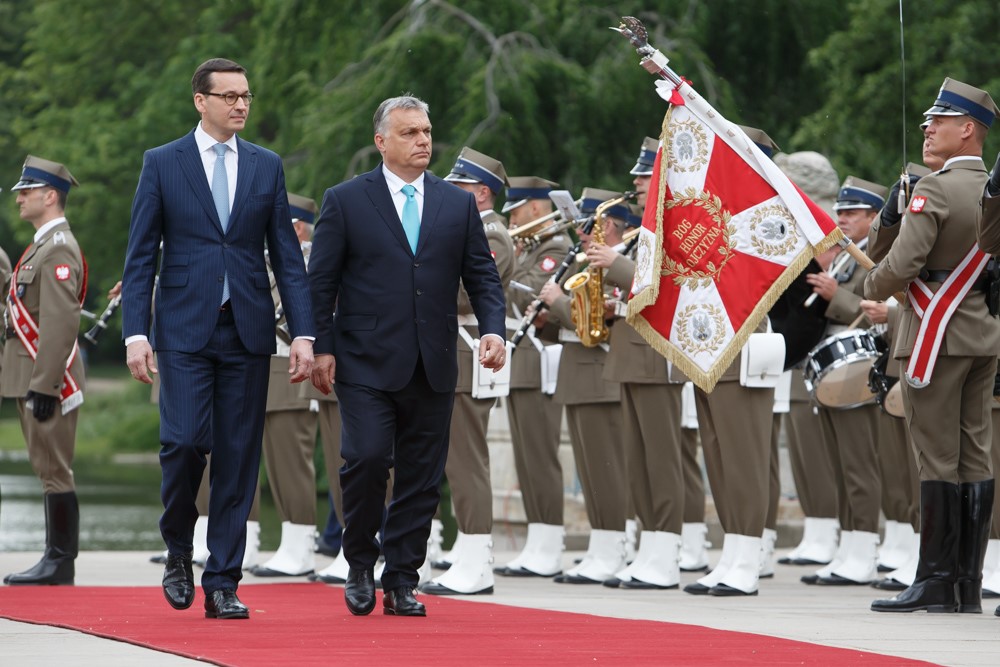Poland’s ambassador to Hungary has criticised his host country’s top general for saying – when discussing the possibility of peace in Ukraine – that World War Two had been a “local” conflict between Germany and Poland that escalated due to a lack of peace efforts.
“These words, which could be interpreted as accusing my country of escalating and complicity in causing a global conflict, are an unacceptable distortion of history for us and should not come from anyone, especially from a representative of a country that is our close ally,” wrote Sebastian Kęciek.
The current national-conservative governments of the two EU and NATO countries have long been close allies. However, that relationship has been frayed by Russia’s invasion of Ukraine, with Budapest maintaining friendly relations with Moscow but Warsaw strongly aligning with Kyiv.
Diplomatic conflict between Warsaw and Budapest after Hungarian Army chief says Poland’s lack of flexibility turned a “local war” with Germany in 1939 into WWII. https://t.co/i7Vd5VkA80
— Yaroslav Trofimov (@yarotrof) May 11, 2023
The ambassador’s intervention comes after Gábor Böröndi, the recently appointed chief of the general staff of the Hungarian armed forces, gave an interview to Hungarian public broadcaster MTVA on Tuesday.
“In 1939, the German-Polish war started as a local war, and what was the end? That escalation was not caught – if I can put it like that – in time by a peace process, and it led to the Second World War,” said the general.
His remarks came after the interviewer had suggested that Hungary’s government is in favour of an immediate ceasefire and peace in the war between Russia and Ukraine, reports Hungarian news website 444.
"Let's think of the Second World War, in 1939 the German-Polish war started as a local war, and what was the end? That escalation was not caught – if I can put it like that – in time by a peace process, and it led to the Second World War," Gábor Böröndi, the new Chief of the… pic.twitter.com/Qe1Aa52RNo
— Szabolcs Panyi (@panyiszabolcs) May 9, 2023
In response, Kęciek wrote that he was “very surprised” by Böröndi’s comments. “The outbreak of the Second World War was not caused by the lack of peace talks with the aggressor but by the policy of appeasement and yielding to the successive demands of the Third Reich,” argued the ambassador.
Kęciek noted that, under a secret protocol of the Molotov-Ribbentrop Pact, Hitler and Stalin had already agreed to partition Poland between them before Nazi Germany and the Soviet Union invaded the country in September 1939.
“We cannot allow the unjust swapping of the victim with the abuser,” added the ambassador. “Poland was an indisputable victim of the criminal and planned actions of the Third Reich and the Soviet Union, and consequently also of their allies.”
Belarus has declared a new national holiday on the anniversary of the Soviet invasion of Poland in 1939, when it divided up the county with Nazi Germany
The Day of National Unity “symbolises restoration of historical justice", says President Lukashenko https://t.co/IV9ayXbol0
— Notes from Poland 🇵🇱 (@notesfrompoland) June 7, 2021
Kęciek pointed out that one of those allies was Hungary. It joined the Axis coalition of Germany, Italy and Japan, a relationship that helped it gain territory from Czechoslovakia and Romania.
But the ambassador also noted that in 1939 Hungary rejected Berlin’s request to support the invasion of Poland. “We will never forget this,” wrote Kęciek. However, he also called for lessons from this history to be applied to the current conflict in Ukraine.
“Today, in the face of Russia’s full-scale, unprovoked and illegal aggression against Ukraine, Europe should learn from World War II and stand in solidarity on the right side of history, on the side of the victim, not the aggressor,” he wrote.
“Only in this way can we bring about lasting peace in Europe,” added the ambassador. “History should not be used to undermine our unity.”
Poland has marked the anniversary of the German invasion that began WWII by warning that the world is letting "history repeat itself" in Ukraine
"Imperial evil has been reborn. And part of Europe still doesn't draw conclusions from the tragedy of the war" https://t.co/EjfezvG2IB
— Notes from Poland 🇵🇱 (@notesfrompoland) September 1, 2022
Main image credit: KPRM/Flickr (under public domain)

Daniel Tilles is editor-in-chief of Notes from Poland. He has written on Polish affairs for a wide range of publications, including Foreign Policy, POLITICO Europe, EUobserver and Dziennik Gazeta Prawna.




















